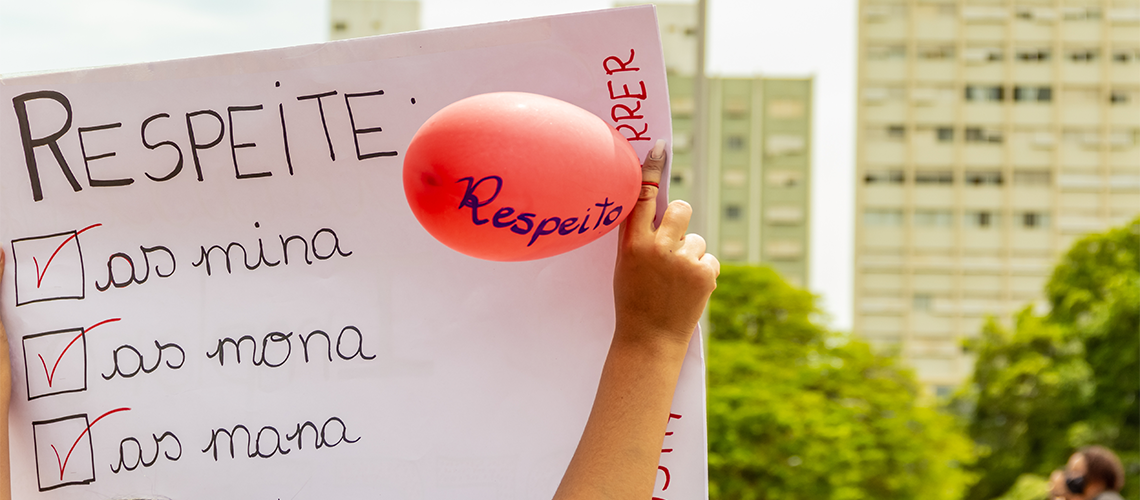Latin America fights femicide with legislation, but cultural change still needed
Margaret TaylorThursday 22 June 2023

Image caption: Respect: me, the girls, the sisters.
Femicide is a global problem, with around 45,000 women and girls killed by an intimate partner or other family member in 2021, according to a report from UN Women. Yet while regionally, Africa has the worst femicide rate overall – 2.5 killings per 100,000 of the female population – in some Latin American countries, the figures are even higher. In Honduras the rate in 2021 was 4.6 cases per 100,000 women, according to the UN Economic Commission for Latin America and the Caribbean (ECLAC), while for the Dominican Republic it was 2.7 cases. El Salvador (2.4), Bolivia (1.8) and Brazil (1.7) all reported rates greater than one. In Brazil and Mexico, meanwhile, while the femicide rates were relatively low, the absolute numbers of killings were notably high, at 1,900 and 1,015 respectively.
Individual states have for several years attempted to address the issue through targeted lawmaking. Brazil enacted its Maria da Penha Law, a ground-breaking piece of legislation named after a women’s rights activist who was left paraplegic by her husband, in 2006. Moira Huggard-Caine, a Member of the IBA Women Lawyers’ Committee Advisory Board and a partner with TozziniFreire Advogados in São Paulo, explains that this is ‘where we started trying to deal with this issue and it’s considered the best law in the world for dealing with domestic violence against women’. She adds that in 2015, Brazil passed a law that establishes femicide as a qualified homicide that carries a higher penalty and places it on the list of heinous crimes. However, she describes the issue as ‘still a work in progress in Brazil’, since the number of cases of femicide isn’t falling.
Similarly, Chile introduced a law in 2010 that established femicide as a specific crime. ‘What that did was increase the protections for potential victims’, says Patricia Silberman, Pro Bono Initiatives Officer of the IBA Latin American Regional Forum and a partner at Carey in Santiago. ‘It established that the consequences would be higher than for the normal crime of murder. That’s something that made it a bit more serious’, she adds.
However, as the statistics show and as the ECLAC report Bringing an end to violence against women and girls and femicide or feminicide states, these laws have failed to make a serious impact. ‘For 15 years, Latin American and Caribbean States have recognised the seriousness of femicidal violence and the gender-related killing of women, which has been expressed in the institutional context through the adoption of laws and protocols and the development of specific institutional frameworks’, the report says. ‘Despite these advances, femicide or feminicide persists and there are no clear signs that it is declining.’
We have an extensive list of laws and decrees in force in Brazil. However, we still have a very long way to go to promote a cultural change
Moira Huggard-Caine
Member, IBA Women Lawyers’ Committee Advisory Board
Against this backdrop, countries in the region are passing laws that are designed, on the one hand, to be more preventative in nature and, on the other, to recognise the wider harms caused by femicide. In Mexico for example, legislators in the state of Puebla have backed reforms that would suspend parental rights for those accused of femicide who are awaiting trial – and remove those rights altogether in the event of a conviction.
Similarly, Silberman says that earlier this year Chile passed a law that ‘creates reparations for the sons and daughters of women that have been the victims of femicide by establishing preferential access to social protection systems and job protections’. The Reparation for Victims of Femicide Law pays a monthly state allowance to children affected by femicide and, according to Danitza Pérez Cáceres, former Executive Director of the female lawyers’ network Abofem, sets an important precedent for the region as whole. ‘This is the first [law to provide] a permanent state allowance for the affected child’, she says.
Despite countries making welcome additions to their statute books, there’s still some way to go before the intent of such legislative changes is reflected in the behaviour of the population. ‘The [Brazilian] government takes it seriously on paper but maybe not in practice’, says Huggard-Caine. ‘We have an extensive list of laws and decrees in force. However, we still have a very long way to go to promote a cultural change, especially in poverty-stricken regions, where access to information and resources for preventing violence are scarce or non-existent.’
Silberman agrees, noting that while having in place laws and penalties that punish femicide is positive, these will not change deep-seated behaviours in and of themselves. ‘It’s one thing to have laws that sanction this more highly, but we need more than just sanctions’, she says. ‘We have to find ways to avoid the reprehensible conduct.’
This hasn’t been lost on law-makers. When Chile passed its state allowance law earlier this year the country’s Minister of Women and Gender Equity, Antonia Orellana, said the aim was not just to provide financial assistance but to highlight that violence against women is a structural problem, too. ‘The most effective measure in the long-term is avoiding the intergenerational transmission of violence’, she said.
Image credit: Angela/AdobeStock.com
